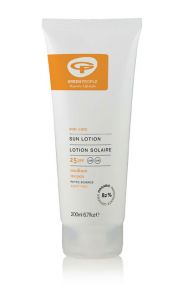Radiance Experts: Midi Fairgrieve on Travel Wellbeing
by Christina Agnew,
Radiance's Executive Nutritional Therapist Midi Fairgrieve explains how to stay well when you are travelling abroad:
It's no fun spending your holiday sick in bed, while 'out there' a wealth of new and exciting adventures are waiting. Believe me, I've done it and as a result missed out on some wonderful experiences. One which comes to mind was the opportunity to meet Sherpa Tenzing at the Tenzing Institute in Darjeeling, India. While my travel companions came back with faces lit up with the experience of having met a truly exceptional mountaineer, I was being sick into a rusty bucket wondering if I would live or die.
On other adventures I have had dysentery, tropical ulcers, sun stroke and intestinal parasites; but it wasn't until I began to study nutritional medicine that I realised just how much can be done to prevent becoming ill. I began to introduce natural remedies into my travel kit with fantastic results, and on my next travels to South America I didn't have even a whiff of trouble - a first for my bowels! As a nutritional therapist I have come across many travellers and holiday-makers whose health has suffered after becoming ill while travelling, which not only affected their holiday but in some cases they are still feeling the effects many years on.
There are a number of natural remedies you can take to make sure you have a problem free trip. It really depends where in the world you are going how much care you need to take. If you’re travelling off the beaten track you will be much more at risk of picking something up. Stomach upsets affect up to 50% of travellers in a two-week stay and what you eat and drink is the commonest route for bugs and parasites and disease-causing organisms to enter the body.
Making sure the water is safe to drink hugely minimises your chances of becoming ill. If in doubt, don't drink the water, use bottled or boil it. You can also add grapefruit seed extract drops to the water which is antiseptic and antibiotic. Added to drinking water, it protects against harmful bacteria and parasites.
With food, there a saying: "Wash it, peel it, boil it, or don’t eat it". It’s pretty good advice if you are travelling in under-developed countries and want to avoid intestinal problems. It’s best to avoid raw salads or unpeeled fruit, and make sure you are careful about washing your hands before eating. Avoid raw fish (sushi, ceviche), and raw or under cooked meat. Busy restaurants are less likely to have food sitting around for too long, and if they're busy they're likely to have a good reputation.
However, trying local dishes is all part of the travel experience, just take care.
Prevention is better than cure:
Your intestinal system is the number one route of entry for unwanted organisms. It can be really protective before you go to start taking anti-parasite remedies and pro-biotics for at least 2 weeks before travelling and keep going for a month after you return. Three of the most effective anti-parasitic remedies are Garlic, Artemesia and Grapefruit Seed Extract. It is also a good idea to boost the population of friendly bacteria in your intestines by taking a pro-biotic supplement before, during and after your trip.
None of these remedies take up much room in your luggage and are well worth the effort.
These are my favourite supplements when travelling with no. 1 on the list being:
- NutriBiotic DefensePlus, which contains Grapefruit Seed Extract and herbs.
- Higher Nature Citricidal Liquid – for adding to water.
- Herbal Anti Parasite Formula from Archturus Foundation.
- Probiotics – buy one that doesn’t need to be kept in the fridge such as Probio-Daily.
- Green Vibrance – a unique nutrient dense green food supplement which ensures you get all the nutrients you need while travelling. Includes chlorella and probiotics.



